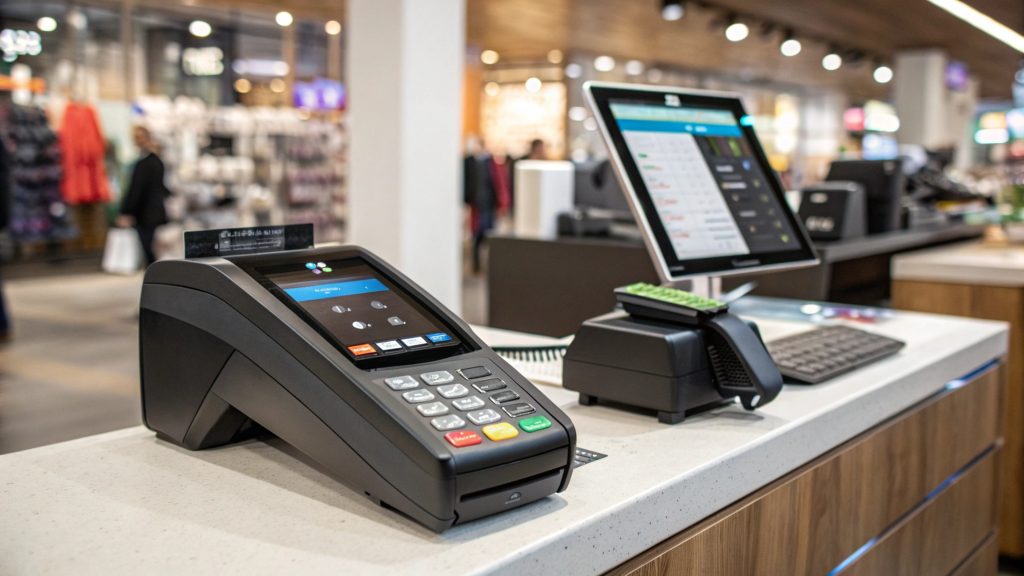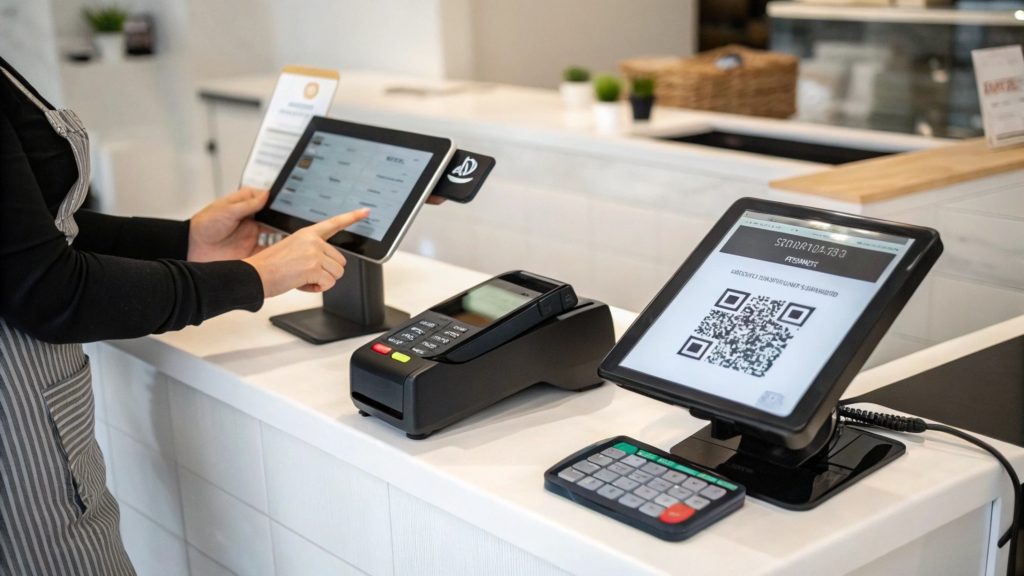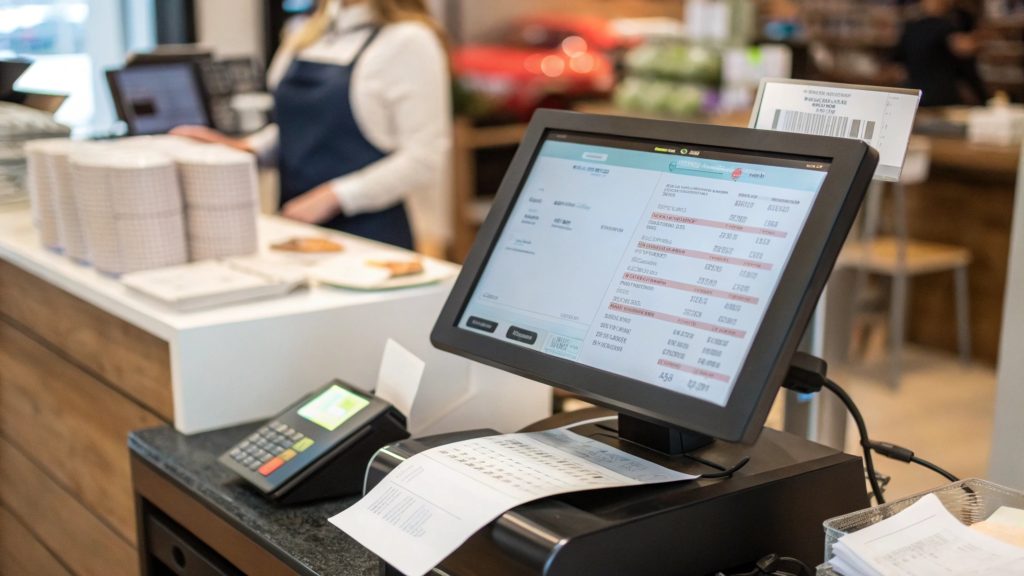I remember when I first thought about accepting cryptocurrency at my shop. It seemed like a big, complicated step. But as I learned more, I realized it could be simple and beneficial. Let me share how POS terminals can help businesses accept crypto payments.
POS terminals for cryptocurrency allow businesses to accept digital payments like Bitcoin and Ethereum. The system generates a QR code, which the customer scans to make the payment. The crypto is then converted to local currency in real-time.
At first, I wasn’t sure if crypto payments were right for my business. But once I got started, it felt easier than I thought. Let me explain how these POS systems work and how they can benefit your business.
What Is a POS System for Cryptocurrency?
Wondering what a POS system for cryptocurrency actually is? It’s a tool that helps businesses accept digital payments—and it’s not as complicated as it sounds.
A crypto POS system is a payment terminal that allows businesses to accept digital currencies. These systems convert payments into local currency and integrate with existing POS setups. It simplifies payments and tax tracking.

When I first explored crypto POS systems, I thought I would need new equipment. But I quickly realized that many systems work with the hardware I already had. The main change was the software. Once I selected a POS provider that supports crypto payments, I linked it to my crypto wallet. The system handled everything from generating QR codes to converting crypto into fiat. It made the process seamless. And best of all, these systems make it easier to track payments for tax purposes. You don’t need to worry about complicated conversions or paperwork—everything is handled for you.
What Are the Key Steps to Set Up a Crypto POS Terminal?
Setting up a crypto POS terminal might seem hard, but it’s actually pretty simple. Let me guide you through it step by step.
To set up a crypto POS terminal, you need compatible hardware, a crypto wallet, and a POS system that supports crypto. Once these are set, the system will automatically generate QR codes for payments.

The first thing I did was check if my existing hardware was compatible. Many POS systems are designed to work with standard devices like tablets or smartphones. The main upgrade was the software. After selecting a provider that supported crypto, I linked my crypto wallet to the POS system. From there, the system generated a unique QR code for each transaction. It automatically converted the crypto into fiat currency, which made it much easier for me. I didn’t have to worry about handling crypto directly—everything was automated.
Which Cryptocurrencies Can I Accept Using a POS System?
You might be asking, which cryptocurrencies can I actually accept? Let’s break it down.
Most POS systems support popular cryptocurrencies like Bitcoin, Ethereum, and Litecoin. Some systems even allow for a wider range of digital currencies, depending on your preferences.

I wanted to offer my customers flexibility, so I checked which cryptocurrencies my POS system could accept. Bitcoin and Ethereum were obvious choices, but I was surprised to find that I could also accept Litecoin, which some of my tech-savvy customers prefer. It wasn’t hard to add these coins to my system. In fact, some POS providers let you choose which currencies you want to accept. This means you can tailor your payment options to meet the needs of your customers. You can even add stablecoins, which are tied to the value of fiat currencies like the US Dollar. This gives your customers more options while helping you manage risk.
What Are the Benefits of Using a Crypto POS System?
Now that we’ve set up the system, let’s talk about why accepting crypto through POS terminals can be so beneficial.
Crypto POS systems can reduce transaction fees, allow for international payments, and protect against fraud. They also offer a modern, future-proof payment method.

One of the biggest advantages of using crypto payments is the lower transaction fees. Credit card companies charge high fees—sometimes up to 3-4% per transaction. With crypto, I found the fees were much lower, around 1%. Plus, I no longer had to worry about currency conversions or extra fees when customers paid with Bitcoin or Ethereum. And because crypto transactions are backed by blockchain, they’re much harder to falsify, which reduces the risk of fraud. Offering crypto payments also helped position my business as modern and forward-thinking, which appealed to a younger, tech-savvy crowd. It was a win-win all around.
How Can POS Terminals Overcome Crypto Volatility?
Cryptocurrency prices can be unpredictable. But can POS systems help protect you from this volatility? Let’s see.
Many POS systems convert crypto payments into fiat currency in real-time, reducing exposure to market fluctuations and stabilizing your cash flow.
At first, I was worried about the volatility of cryptocurrencies. The price of Bitcoin can change a lot in a single day. But with my POS system, I didn’t have to worry. The system automatically converted every crypto payment into fiat currency as soon as it was received. This eliminated any risk of price fluctuations. Even if Bitcoin’s price dropped right after a payment, my business was protected because I was paid in local currency. This feature is crucial for businesses that want to accept crypto payments without the risk of losing value.
How to Ensure Compliance with Legal and Tax Obligations?
Cryptocurrency payments come with legal and tax responsibilities. Here’s how to stay compliant while accepting crypto.
Most crypto POS systems help with tax reporting by tracking every transaction. They also generate reports that comply with local laws and make it easy for you to file taxes.

When I first considered accepting crypto, I wasn’t sure how to handle tax reporting. But the POS system I chose made it much easier. It tracked every transaction, recording both the crypto amount and its equivalent value in fiat currency. This feature was incredibly helpful during tax season. Some POS systems even integrate with accounting software, so everything syncs automatically. While I still recommend working with a tax professional, having this feature made it much easier to stay compliant with local laws.
Summary
Accepting crypto payments through a POS terminal is simpler than it seems. By offering Bitcoin, Ethereum, and other digital currencies, you can lower fees, reduce fraud, and future-proof your business. Ready to make the change?


